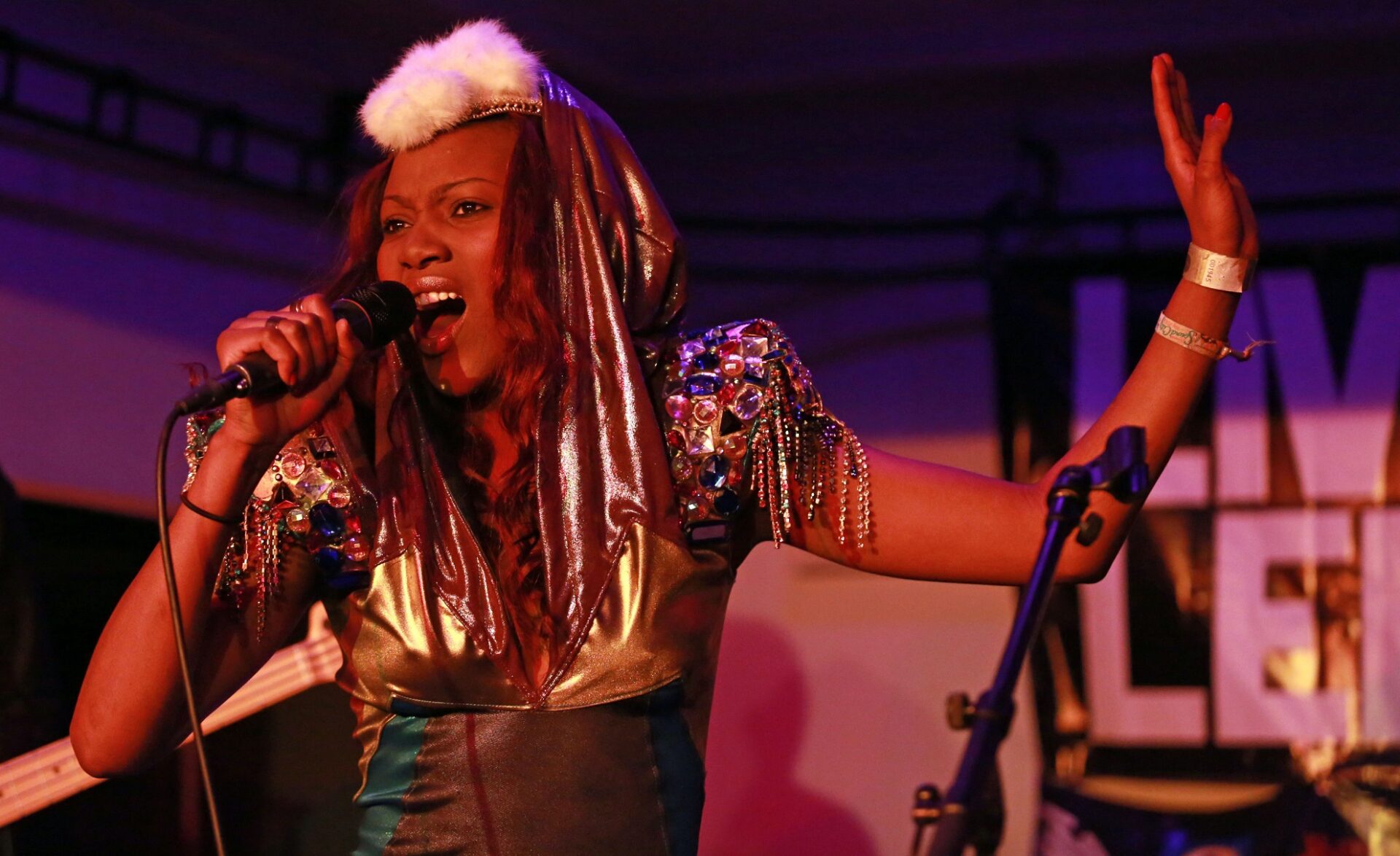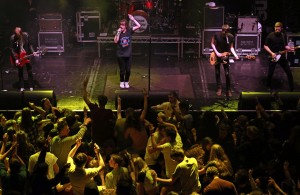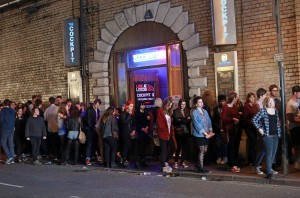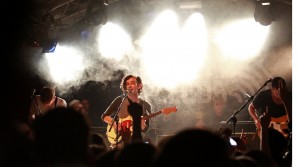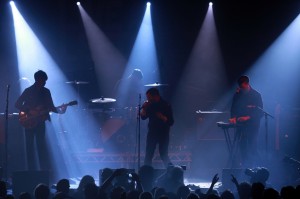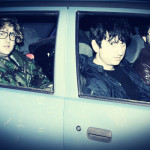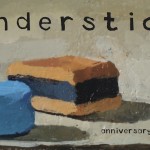Live at Leeds is all about making choices. Faced with a grand total of 147 acts appearing at 15 different venues, all spread out over a mile and a half diameter from the Brudenell Social Club in the north west of the city to The Wardrobe in the south east, you are always going to be faced with some very difficult decisions during this the seventh annual outing of this hugely popular festival. There are a number of ways in which to approach the day; you can opt for the meticulous forward planning of a military expedition or alternatively adopt a scattergun supermarket sweep technique by trying to see and hear as much as is humanly possible in the twelve hours that are available to you. There again you could just as easily stay put in one location all day, thus avoiding the inevitable queues which are already starting to build up at the more popular spots by early afternoon, or even just go for any combination of all of these strategies. Whatever trajectory you choose to take when following this inspired sequencing of events combining the placement of emerging local talent alongside more established national acts, a great time is virtually guaranteed. What ensues here is but one travelogue of a glorious Saturday spent enjoying what is Live at Leeds.
Having secured a wristband which will then entitle you to access all fifteen venues (capacities permitting) from the central collection point at Leeds City Museum, a short walk back down Cookridge Street brings you to the Nation of Shopkeepers pub and Georgia Thursting one of the four acts who are simultaneously opening the event at midday across the city. The Leeds College of Music student provides a gentle start to the day weaving her wanton tales of love and desire across a jazz-infused tapestry the mature sophistication of which belies her tender years.
En route to the dark arches underneath Leeds railway station and the home of The Cockpit on a day in which the EDL were peddling their poisonous message in another part of the city, it was reassuring to pass trade unionists marching towards their own rally near the Town Hall. Upstairs in Cockpit 3 another teenager, Jordan Allen knocked out his own impassioned songs to a small but receptive crowd.
Through Leeds City Market, past the bus station and across from the College of Music lies The Wardrobe. SJBRAVO suffer from the venue being slightly off the Live at Leeds beaten track, playing as they do to a sparse audience. This does nothing, though, to diminish their energy, enthusiasm and power as they deliver an early highlight, a blistering set which is doused in soul, pop and great promise.
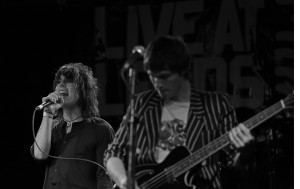 Back from whence we came to The Cockpit to catch The Struts, Richard Petch is proving popular to the crowd at Milo’s Downstairs as they spill out of the pub doorway and into the steady flow of afternoon shoppers who are making their way up and down Call Lane. Derby’s very own The Struts live up to their name with a swaggering confidence which is present in all great rock n roll bands from the Rolling Stones to Aerosmith, and in lead singer Luke Spiller they have a charismatic focal point with a voice lifted right out of the David Johansen mould.
Back from whence we came to The Cockpit to catch The Struts, Richard Petch is proving popular to the crowd at Milo’s Downstairs as they spill out of the pub doorway and into the steady flow of afternoon shoppers who are making their way up and down Call Lane. Derby’s very own The Struts live up to their name with a swaggering confidence which is present in all great rock n roll bands from the Rolling Stones to Aerosmith, and in lead singer Luke Spiller they have a charismatic focal point with a voice lifted right out of the David Johansen mould.
Back up onto Boar Lane and into the Holy Trinity Church and its three hundred years of history, the pews are already full for the remarkable talent that is George Ezra. Looking as if he has just stepped out of the church choir, if you closed your eyes his voice takes the form of an ethereal body, part Richie Havens, part motherless child. It seems only right that his spirited, spiritual melodies should be heard in such a place of worship.
And so to the O2 Academy and in a shrewd piece of scheduling by the organisers in not loading all of your big guns at the business end of the day, it is the turn of The Pigeon Detectives. There is precious little fuss or pretence about these local heroes whose take on what might be described as indie-rock leaves precious little to the imagination but not surprisingly goes down an absolute storm with those in the mid-afternoon capacity auditorium.
Bebe Black, by marked contrast, projects light and shade from Leeds Met’s main stage with a set chock-full of shimmering, spectral electro-pop jewels all conveyed in a voice which can be neatly filed under popular chanteuse. A walk up through the University precinct to The Faversham pub affords an opportunity to cleanse the palate before experiencing another quintessential pop diva and singer of songs. Nottingham’s Indiana is cut from a much darker cloth and the quavering anguish of her voice is matched perfectly by the mournfully textured programmed beats that accompany her captivating performance.
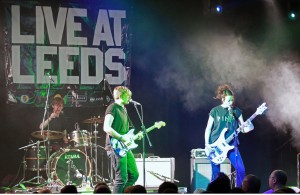 Three of the events’ venues are all housed under the same roof in the heart of the Leeds University campus – Stylus, the Refectory and Mine – and it is to there we go to embrace the respective late afternoon/early evening triple fusillade that is three of Leeds’ finest, Post War Glamour Girls, Dinosaur Pile Up and Castrovalva. This graveyard slot is exactly what Post War Glamour Girls’ music craves, creeping around as it does in the long shadows before erupting upon you like some venerable afterlife force vacillating, as it does, between despondency and hope. Dinosaur Pile Up dispense with any such nuances and bludgeon you into submission, with any breath that may be left in your body finally extinguished by a form of aural strangulation that goes by the name of Castrovalva.
Three of the events’ venues are all housed under the same roof in the heart of the Leeds University campus – Stylus, the Refectory and Mine – and it is to there we go to embrace the respective late afternoon/early evening triple fusillade that is three of Leeds’ finest, Post War Glamour Girls, Dinosaur Pile Up and Castrovalva. This graveyard slot is exactly what Post War Glamour Girls’ music craves, creeping around as it does in the long shadows before erupting upon you like some venerable afterlife force vacillating, as it does, between despondency and hope. Dinosaur Pile Up dispense with any such nuances and bludgeon you into submission, with any breath that may be left in your body finally extinguished by a form of aural strangulation that goes by the name of Castrovalva.
It is therefore something of a blessed relief to then step back into the sanctuary of Leeds Met University union building and the celestial calm of London Grammar. The tranquillity of their chilled out electronica washed over by the lapping waves of Hannah Reid’s gentle croon is a welcome balm for the evening ahead. A quick two-step via the traditional indie-rock of Filthy Boy and Tribe’s even more generic rock propels you past an incredibly lengthy queue snaking along the whole of Swinegate and into The Cockpit courtesy of a press pass.
Everyone, it would seem, wants to catch The 1975, one of the hottest tickets in town right now. If you favour wholesome hook-laden choruses welded to contagious indie-guitar riffs then you would not be leaving this packed, sweaty Anderson shelter of a venue disappointed.
By now it feels like a long haul back up to The Faversham and it is one that will require the benefit of automated transport, but it is a journey that proves to be so worthwhile. Lulu James packs into twenty minutes what ultimately proves to be the show of the day. It is an exercise in how to marry sassy showmanship with new-age soul and one of the best super lunged voices this side of her namesake Etta. It is a towering performance, remarkable in how she manages to get from nought to sixty in such a short space of time before signing off with an inspirational walk through her forthcoming single and would-be dance floor classic Creation Of Love.
Monitor problems delay the start of Laura Mvula’s set but this doesn’t stand in the way of the woman whose star is most firmly in the ascendency. She floats through her performance with a quiet assurance and equanimity which is reflected in the peaceful serenity of her songs. Sounding much like a young Nina Simone and for all that Mvula’s music is very easy on the ear, you do yearn for some of the High Priestess of Soul’s vitriol and 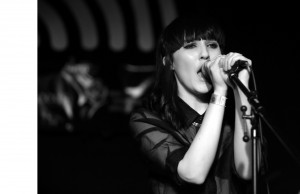 anger to imbue it with an element of danger and excitement. This, though, is not an argument you can level at PINS. The all-female, Mancunian four piece provide the missing link between punk and power pop as they fearlessly career through their set with not a by-your-leave to sentiment nor sensibility. It is little wonder that Alice from Post War Glamour Girls earlier had their name emblazoned across her T-shirt.
anger to imbue it with an element of danger and excitement. This, though, is not an argument you can level at PINS. The all-female, Mancunian four piece provide the missing link between punk and power pop as they fearlessly career through their set with not a by-your-leave to sentiment nor sensibility. It is little wonder that Alice from Post War Glamour Girls earlier had their name emblazoned across her T-shirt.
Having taken this particular route through the course of the day, and then factoring in the inevitable clashes you are going to find at any festival, means there is no time or space for a trip to the Brudenell or the opportunity to catch Humanfly, Savages, These Monsters, Dutch Uncles, Peace, Darwin Deez or Aluna George for that matter. But by half past ten at night, and 19 artists and 13 venues later, it did seem perfectly fitting that a most magnificent Live at Leeds should finish at the very place that had given it its name, the Refectory at Leeds University where some 40 odd years ago The Who had recorded what perhaps today is still the greatest live album of all time. Now Everything Everything is never going to be mentioned in the same breath as The Who but the overwhelming pomposity of their music does bring a strangely euphoric conclusion to what has been an unmitigated success in the planning, preparation, programming and downright sheer exhilaration of the execution of Live at Leeds’ delivery.

